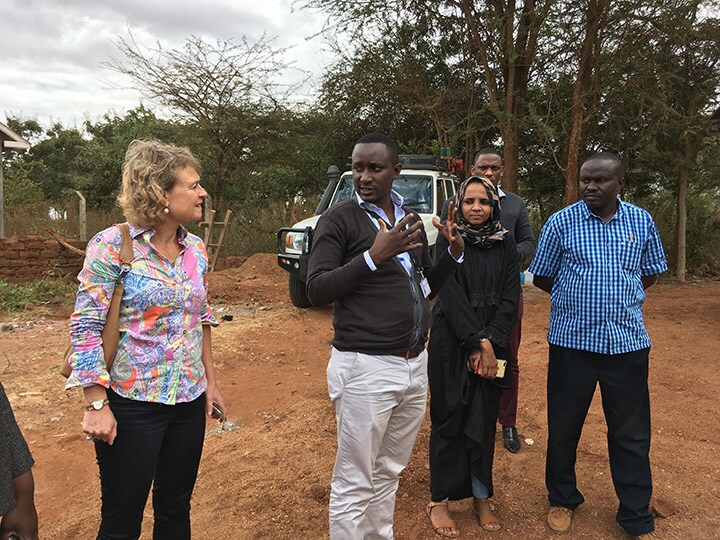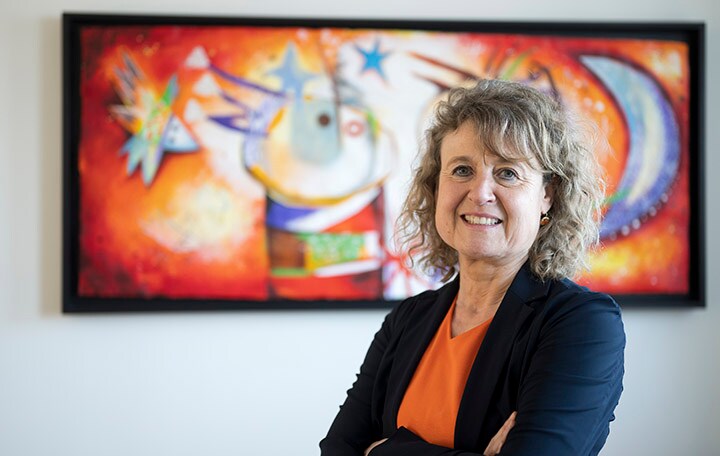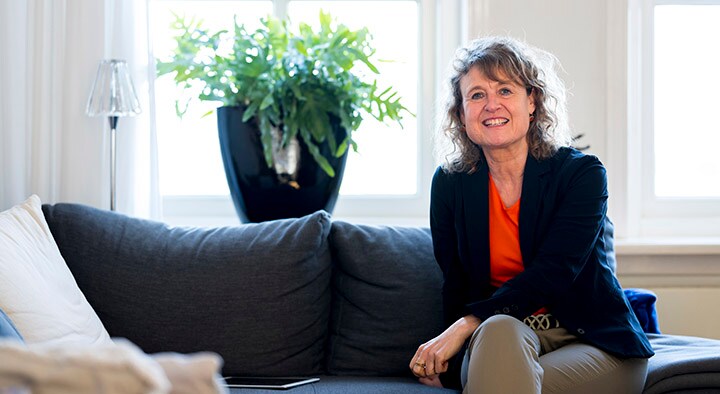Naar schatting 3,5 miljard mensen hebben niet de toegang tot de zorg die ze nodig hebben. Dat is de helft van alle mensen wereldwijd [1].
Philips is daarom op een missie om, in 2030, de levens te verbeteren van 400 miljoen mensen in achtergestelde gebieden. Een van de grootste struikelblokken bij het opzetten van dit soort zorgvoorzieningen in afgelegen gebieden: geld.
“Investeringen in zorgprojecten in achtergestelde gebieden hebben vaak een ongelukkige combinatie van relatief laag rendement en hoog risico. Op de kapitaalmarkt is dat niet zo aantrekkelijk.” Dat vertelt Annette Jung, die binnen Philips verantwoordelijk is voor ‘impactfinanciering’.
Niet alleen financieel rendement, maar ook sociale opbrengst
Dat wil zeggen dat ze financieringsoplossingen verzorgt waarbij niet alleen gekeken wordt naar financieel rendement, maar ook naar ‘sociale opbrengst’. Zoals, inderdaad, het verbeteren van levens in gebieden waar nog geen toegang is tot basiszorg.

“Bij veel van de projecten waar Philips aan werkt in Afrika of Azië, merkten we dat financiering ingewikkeld was. Investeringen via bestaande partners kwamen vaak niet van de grond, vanwege de combinatie van hoog risico en lage opbrengsten. Samen met andere partijen zijn we impactinvesteringsfondsen op gaan zetten, met toegang tot basiszorg als doel. Dat is best een grote stap voor een groot bedrijf dat niet in de financiële sector zit. Zo wordt het ook gezien door het ecosysteem van impactfinanciers; de betrokkenheid van Philips werkt als een katalysator, waardoor ook andere partijen besluiten om te gaan investeren.”
Bij veel van de projecten waar Philips aan werkt in Afrika of Azië, merkten we dat financiering ingewikkeld was. Investeringen via bestaande partners kwamen vaak niet van de grond, vanwege de combinatie van hoog risico en lage opbrengsten.
Annette Jung
Impact Finance
Samen kun je meer impact maken en risico delen
Annette is binnen Philips de spil van impactfinancieringsprojecten in onder meer Afrika en Azië: “We zoeken daarbij de samenwerking op met andere organisaties, omdat je zo nog meer impact kunt maken en het risico kunt delen. Zo zijn we onderdeel van de zogeheten Health Finance Coalition; een groep investeerders en internationale organisaties in de gezondheidszorg waar ook onder meer de World Health Organization en de Bill and Melinda Gates Foundation onderdeel van is. Samen zijn we bezig een nieuw fonds op te zetten voor impactfinanciering voor zorgprojecten in Afrika.
En sinds begin vorig jaar werken we samen met de Nederlandse Financieringsmaatschappij voor Ontwikkelingslanden om zogeheten proof of concepts te financieren. We bekostigen gezamenlijk zorginnovaties in de praktijk, waarbij Philips ook een technologie- en implementatiepartner is. De lening voor deze projecten hoeft pas terugbetaald te worden als het project succesvol blijkt en er geld mee verdiend wordt.
Daarmee zetten we de deur open voor veel slimme, vindingrijke initiatieven, zoals een project in Congo waarin we onder meer hulp en echografie kunnen bieden aan zwangere vrouwen. Daarmee kunnen we moeder- en kindsterfte in afgelegen gebieden enorm terugdringen.”

In haar huidige rol komen twee voorliefdes van Annette samen: “Ik heb een bancaire achtergrond, maar ben ook al sinds de start van de Philips Foundation betrokken als vrijwilliger met focus op samenwerking met sociale ondernemers. Zo komen mijn expertise op gebied van financiering samen met mijn passie voor gezondheidszorg in Afrika. Door projecten te ondersteunen met een passende impactfinanciering, kunnen we echt impact maken op plekken waar dit het hardst nodig is. Geld kan hele mooie dingen doen.”
Door projecten te ondersteunen met een passende impactfinanciering, kunnen we echt impact maken op plekken waar dit het hardst nodig is. Geld kan hele mooie dingen doen.
Annette Jung
Impact Finance
“We kunnen vaak al heel veel impact maken door simpelweg de zorg dichterbij mensen te brengen. Als je een lange weg moet afleggen naar het ziekenhuis en je wil ook een familielid meenemen, dan ben je daar al veel geld aan kwijt; niet alleen door reiskosten, maar ook doordat inkomsten wegvallen tijdens de lange reis. Zorg dichtbij is gewoon echt een manier om betaalbare toegang te geven tot basiszorg.”
Nieuwe technologieën maken zorg in afgelegen gebieden leveren eenvoudiger
Haar droom voor de toekomst? “Ik denk dat nieuwe technologieën het steeds eenvoudiger gaan maken om zorg te leveren aan afgelegen gebieden. Dat zien we nu al bij de Lumify; omdat je een draagbaar echografiesysteem hebt, kun je naar zwangere vrouwen in afgelegen gebieden toe, in plaats van dat ze naar het ziekenhuis moeten komen. De drempel wordt zo een stuk lager en dat scheelt gewoon levens; nu komt het nog regelmatig voor dat moeders en/of kinderen overlijden bij de bevalling omdat ze te laat naar een arts gaan.
En het opvallende is; basiszorg voor iedereen is vaak niet een kwestie van geldgebrek, maar van financieringsproblemen. We moeten een manier vinden om het beschikbare geld te koppelen aan projecten en projecten ‘investeerbaar’ te maken. Als grote bedrijven als Philips een katalysatorrol spelen, dan kunnen ook deze projecten met een relatief hoog risico en lage opbrengst gefinancierd worden. Daarmee kunnen we een enorme impact maken op de wereld.”
En het opvallende is; basiszorg voor iedereen is vaak niet een kwestie van geldgebrek, maar van financieringsproblemen. We moeten met elkaar een manier vinden om het beschikbare geld te koppelen aan projecten en projecten ‘investeerbaar’ te maken.
Annette Jung
Impact Finance
[1] Onderzoek van de WHO uit 2019: https://www.who.int/healthinfo/universal_health_coverage/report/uhc_report_2019.pdf?ua=1
In de serie ‘duurzaam doen’ laten we de mensen aan het woord die zich binnen Philips elke dag bezighouden met het realiseren van duurzaamheidsdoelstellingen.
Lees ook:
Philips wil 2,5 miljard levens verbeteren in 2030; hoe en waarom meten we dat? Robert Metzke, Head of Sustainability, legt uit waarom Philips zichzelf duurzaamheidsdoelstellingen stelt en hoe de resultaten worden gemeten en berekend.
Teddy Heerbaart doet er binnen Philips Circular Equipment alles aan om goede onderdelen van medische apparatuur niet verloren te laten gaan, maar juist in te zetten voor de toekomst. “Bij ons krijgt medische apparatuur een tweede, en soms zelfs een derde leven.”
“Al bij de eerste design-schets moet je nadenken over circulariteit.” Samen met haar team is Design Strategist Aylin Groenewoud elke dag bezig om de producten en diensten van Philips nog groener te maken.
Philips heeft een missie om in 2030 het leven te verbeteren van minimaal 400 miljoen mensen in achtergestelde gemeenschappen. Luc De Clerck werkt al sinds jaar en dag aan projecten om dat voor elkaar te krijgen: “Philips Community Life Centers dragen bij aan de oplossing van een enorm probleem in afgelegen gebieden: hoge moeder- en kindersterfte.”
“Philips had als doel om in 2020 CO2-neutraal te zijn. Dat hebben we bereikt. Ook hadden we de ambitie om 100% gebruik te maken van groene energie. Ook dat is gelukt.” Als Senior Director Sustainability levert Simon Braaksma een belangrijke bijdrage aan de duurzaamheidsdoelstellingen van Philips.
De technische ontwikkelingen op het gebied van recycling gaan dus hard. Maar als het aan Mark-Olof Dirksen zou liggen, dan mag het nog wel wat harder gaan. Hij is specialist in het selecteren en ontwikkelen van materialen en werkt met teams van over de hele wereld om Philips-producten nog duurzamer te maken.
“Samen met onze leveranciers kunnen we ruim zeven keer zo veel impact maken op het klimaat als Philips alleen.” Als Supplier Sustainability Manager werkt Dylan McNeill aan het verduurzamen van de toeleveringsketen van Philips.

"Primary care for everyone is often not a matter of a lack of money, but of funding problems"
An estimated 3.5 billion people do not have access to the healthcare that they need. That's half of all people worldwide [2].
That is why Philips is on a mission to improve, by 2030, the lives of 400 million people in underserved communities. Money is often one of the biggest stumbling blocks in setting up healthcare facilities in remote areas.
"Investments in healthcare projects in underserved communities often have an unfortunate combination of a relatively low return and high risk. On the capital market, that's not very attractive", said Annette Jung. Within Philips she is responsible for ‘impact financing’.
Not only financial return, but also social return
This means providing financing solutions that not take into account the financial return, but also at the ‘social return’. Such as, indeed, improving lives in areas where access to primary care is not yet available.

"In many of the projects Philips is working on in Africa or Asia, we noticed that financing was complicated. We often couldn’t get investments through existing partners, due to the combination of high risk and low returns. Together with other parties, we set up impact investment funds, to provide access to basic healthcare. That's quite a big step for a large company that is not in the financial sector. The ecosystem of impact funders also perceive it like this; Philips' involvement works as a catalyst, which convinces other parties to invest as well."
In many of the projects Philips is working on in Africa or Asia, we noticed that financing was complicated. We often couldn’t get investments through existing partners, due to the combination of high risk and low returns.
Annette Jung
Impact Finance
Together you can make more impact and share risk
Within Philips, Annette is the pivot of impact financing projects in Africa and Asia: "We look for cooperation with other organizations, so we can make even more impact and share the risk. For example, we are part of the Health Finance Coalition, a group of investors and international organizations in healthcare including the World Health Organization and the Bill and Melinda Gates Foundation. Together we are setting up a new fund for impact financing for healthcare projects in Africa.
And since the beginning of last year we have been working with the Dutch development bank FMO to finance so-called proof of concepts. We are jointly funding real-world healthcare innovations, where Philips is also a technology and implementation partner. The loan only needs to be repaid if these projects turn out to be successful and generate income.
This opens the door for many smart, creative initiatives, such as a project in Congo in which we can offer help and ultrasound to pregnant women, among other things. With that, we can greatly reduce maternal and child mortality in remote areas."

In her current role, two of Annette's passions come together: "I have a banking background, but have also been involved as a volunteer since the start of the Philips Foundation with a focus on working with social entrepreneurs. This is how my expertise in the field of finance meets my passion for healthcare in Africa. By supporting projects with appropriate impact funding, we can make a real impact in places where it is most needed. Money can do very good things."
By supporting projects with appropriate impact funding, we can make a real impact in places where it is most needed. Money can do very good things.
Annette Jung
Impact Finance
"We can often make a lot of impact simply by bringing care closer to people. If you have to travel a long way to the hospital and want to take a family member with you, you're already spending a lot of money. Not just because of the travel costs, but also because income is lost during the long trip. Bringing healthcare closer is a really good way to provide affordable access to basic care."
New technologies make delivering care in remote areas easier
Her dream for the future? "I think new technologies are going to make it much easier to deliver care to remote areas. We can already see that with the Lumify; thanks to this portable ultrasound system, you can go to pregnant women in remote areas, instead of them having to come to the hospital. So the threshold becomes a lot lower and that just saves lives; now it's still common for mothers and/or children to die in childbirth because they go to a doctor too late.
What strikes me is this: primary care for everyone is often not a matter of lack of money, but of funding problems. We need to find a way to link available money to projects and make projects 'investable'. If large companies like Philips play a catalytic role, then even these projects with relatively high risk and low return can be funded. With that, we can make a huge impact on the world."
What strikes me is this: primary care for everyone is often not a matter of lack of money, but of funding problems. We need to find a way to link available money to projects and make projects 'investable'.
Annette Jung
Impact Finance
[2] WHO research from 2019: https://www.who.int/healthinfo/universal_health_coverage/report/uhc_report_2019.pdf?ua=1
In the series Sustainability in Action, we explore the stories and people behind Philips' sustainability goals. Who are the people who make sure every day that Philips’ ambitions in the areas of good health & well-being, responsible consumption & production and climate are met?
Read also:
Philips wants to improve 2.5 billion lives by 2030; how and why do we measure it? Robert Metzke, Head of Sustainability, explains why Philips sets itself sustainability targets and how the results are measured and calculated.
Teddy Heerbaart, at Philips Circular Equipment, does everything possible to ensure that good parts of medical equipment do not go to waste, but are used for the future. "With us, medical equipment gets a second, and sometimes even a third life."
"From the very first design sketch, you have to think about circularity." Together with her team, Design Strategist Aylin Groenewoud is working every day to make Philips' products and services even greener.
Philips has a mission to improve the lives of at least 400 million people in disadvantaged communities by 2030. Luc De Clerck has been working on projects to achieve this for many years: "Philips Community Life Centres help solve a huge problem in remote areas: high maternal and child mortality."
"At Philips we had the goal of being carbon neutral by 2020. We achieved that. We also had the ambition to use 100% green energy. We achieved that too." As Senior Director Sustainability, Simon Braaksma made a significant contribution to the achievement of Philips' sustainability targets.
The technical developments in the field of recycling are going fast. But for materials specialist Mark-Olof Dirksen, things could go even faster: “Making a product circular can be done in a lot of different ways”
"Together with our suppliers, Philips can make over seven times more impact on the climate than we could on our own." As Supplier Sustainability Manager, Dylan McNeill focuses on making Philips' supply chain more sustainable, together with suppliers.












